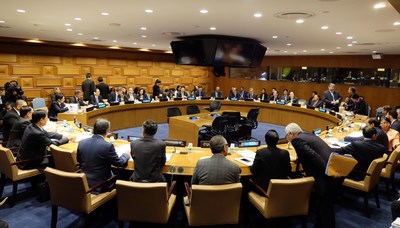Subjects: ENI, ENP
Thailand Promotes Partnerships for a Sustainable World
BANGKOK, Aug. 1, 2017 /PRNewswire/ -- By sharing its Sufficiency Economy Philosophy as a model, Thailand is helping other developing nations achieve the Sustainable Development Goals, Ministry of Foreign Affairs, stated.

Of the 17 Sustainable Development Goals of the United Nations, the final goal ? revitalize the global partnership for sustainable development ? may be the most compelling of all. Because the only way we can build a better world is by working together. So many of the challenges we face, from climate change to eradicating diseases, are borderless. Although we measure results on a nation-by-nation basis, unless nations can find ways to work together for the good of our planet and its peoples, our future will ultimately be unsustainable.
As the 2016 chair of the Group of 77 ? the largest coalition of developing nations at the United Nations ? the Kingdom of Thailand made its primary mission to enhance cooperation between North and South and also to strengthen South-South Cooperation. This exchange of resources, technology and knowledge between developing countries, often referred to as the Global South, can be complementary to achieving the Sustainable Development Goals. As chair country, Thailand worked to transform this vision into action. Even before its chairmanship, Thailand had been sharing its own model of development among countries grappling with the challenges of a changing world. That model is known as the Sufficiency Economy Philosophy.
Initiated by the late monarch King Bhumibol Adulyadej through decades of working to uplift the nation's poor people, the Sufficiency Economy Philosophy is an approach to development and to life that is based on moderation, reasonableness and prudent decision-making. It prescribes living in harmony with the environment and making wise use of resources in order to build resilience and wellbeing. Its principles can be applied to farmers, communities, businesses and nations. In the context of the philosophy, sufficiency does not mean living in isolation. It calls for communities to work together for the common good ? the essence of partnerships.
Thailand understands the value of working together. Once a country in need of development assistance, Thailand is now a donor nation, providing fund and sharing its resources of knowledge, technical assistance, scholarships and capacity building with less developed nations. In 2015, the Kingdom provided $78 million in Official Development Assistance to other countries through the Thailand International Cooperation Agency, while foreign direct investment surpassed $58 billion, with much of it going to the developing world.
While generous funding is important, even more value lies in Thailand's willingness to share its knowledge and experience with the Sufficiency Economy Philosophy. To date, representatives from 105 countries have participated in workshops, seminars and training courses hosted by Thailand on the philosophy and its applications.
Thailand has been partnering with several countries to help them implement their own development projects based on Sufficiency Economy Philosophy principles and methods. Timor-Leste is employing decision-making processes based on the philosophy's framework for sustainable agriculture projects and to support the launch of small businesses. Cambodia has established a Sufficiency Economy village as a pilot for more communities. Indonesia is using sufficiency principles shared by Thai advisors for ecological farming projects that raise incomes and quality of life for villagers. And neighboring Myanmar is working with Thai partners to establish sustainable development centers and rural development projects on sufficiency principles.
Far beyond Asia, the Sufficiency Economy Philosophy is being adopted for the benefits of local peoples. In the southern African nation of Lesotho, Thailand has supported the establishment of a center to introduce integrated farming and agro-forestry farming that is protecting that nation's environment while providing greater food security and livelihoods for participants. Several nations in South America have also been applying approaches based on the philosophy.
"Development approaches like the Sufficiency Economy Philosophy of Thailand, that promotes development with values, which not only complement the [SDG] agenda, but our own national development framework, will certainly help us in implementing the SDGs,'' Guillame Long, Ecuador's Minister of Foreign Affairs, told the UN General Assembly last year.
Achieving the Sustainable Development Goals by 2030 will require commitment and perseverance. For some countries in the Global South with limited resources and capacities, the tasks at hand may appear enormous. Despite its own limitations, Thailand achieved the Millennium Development Goals ahead of schedule, owing a significant degree of that success to the Sufficiency Economy Philosophy. Thailand is willing to partner with any country seeking knowledge, expertise and a proven path to sustainable development. Because there is only one way to build a better world ? and that way is together.
CONTACT:
Ministry of Foreign Affairs
Tel. +662 203 5000 ext. 22050
Photo - https://mma.prnewswire.com/media/540501/Foreign_Affairs_Thailand.jpg
These press releases may also interest you
|
News published on and distributed by:



